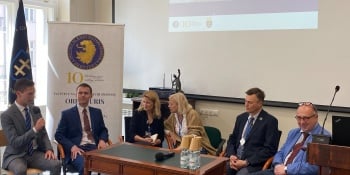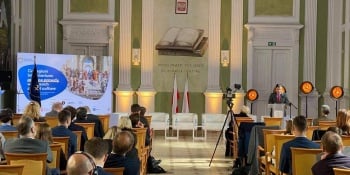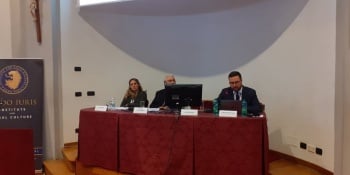
The Constitutional Tribunal has still not considered the motion for declaring the unconstitutionality of provisions allowing eugenic abortion. In the opinion of the so-called friend of the court, the Ordo Iuris Institute proves that provisions of the abortion law are not compliant with the Constitution. This concerns the regulations that abolish penalty for killing an unborn child, if there is “high probability of a serious and irreversible impairment of the fetus or an incurable disease threatening his life”. That was the topic to which the Ordo Iuris dedicated its press conference participated by Maria Madise (Voice of the Family, Society for the Protection of Unborn Children) and Hugo Bos (Civitas Christiana). Ordo Iuris and foreign pro-life organizations are fighting for protection of life in the international arena and on the national forum.
The motion to the Constitutional Tribunal was submitted in June 2017 by a group of over 100 deputies. They plead that provisions of the abortion law are contrary to the Constitution, which requires protection of human dignity and human life, prohibits discrimination on grounds of disability and age, and guarantees the right to court. Applicants aptly note that the criteria allowing eugenic abortion, that is “high probability” or “severe handicap” are imprecise and must be interpreted in favor of the perpetrators (aborters). In practice, this largely limits the protection of lives of unborn children in Poland. Other participants in the proceedings, i.e. the Sejm and the Prosecutor General, in the letters sent to the Tribunal shared the applicant's view that the challenged provisions are contrary to the Constitution.
In its opinion, Ordo Iuris first of all stresses that the Constitution of the Republic of Poland and numerous international agreements to which Poland is a party guarantee legal protection of life and do not introduce any exceptions, including due to age and health. In particular, such a request comes from the 1989 Convention on the Rights of the Child, which explicitly orders children to be protected by law, both before and after birth. Contrary to postulates and untrue information from pro-abortion movements, neither the Polish Constitution (and other legal provisions) nor international law guarantees the right to kill other people, including the right of the mother to kill her unborn children (called by these groups “the right to abortion” or “reproductive rights”).
‘The 1997 Constitution and international conventions and pacts in the field of human rights do not limit the legal protection of life only to people born. The protection of human life, both before and after birth, is the responsibility of public authorities. This is the basic standard of a democratic state ruled by law, as the Constitutional Tribunal noted in the ruling of 28 May 1997, considering abortion “because of difficult living conditions or a difficult personal situation of a pregnant woman” contrary to the Constitution,’ explains Marcin Olszówka, PhD, expert of Ordo Iuris.
Since 1997, the Constitutional Tribunal has repeatedly reiterated in statements of reasons of its rulings that the Constitution protects the life of every human being, regardless of age and predictable life expectancy. As the Court observed in the judgment of 30 September 2008, the life of one person is a value higher than the health of other people. The resolution of the Constitutional Tribunal of 18 April 2018, in which it signaled to the Sejm irregularities in the act regulating the in vitro fertilization procedure, may be considered a summary of the previous case law regarding legal protection of human life, including at the earliest stage. The Tribunal noted that the principles of the Polish legal system include the “embryo’s right to life” and “prohibition of treating any embryo as an object”.
Since, therefore, a human being within the meaning of the provisions of the Constitution is any creature having a human genome, regardless of the stage of development, it is unacceptable to allow the killing of any human being, including because of age and health.
The Basic Law requires public authorities to protect and respect human dignity, which stands for i.e. a ban on subjective treatment of a human person. Meanwhile, in the light of the challenged provisions, an unborn child suspected of having a serious illness or disability becomes a “substitutable good”, “ceases” to be someone, i.e. a person with natural human dignity, because it is treated as “something” unsuccessful, what still can (needs to) be removed and “replaced” with a healthy child in the future. The essence of the challenged regulations is the admission to the killing of an unborn man (until reaching the ability to live independently outside the mother’s body) in the case of whom there is a high probability – but always only probability – of a serious and irreversible impairment or fatal disease.
It also means that the legislator allowed for radically different shaping of the legal situation of unborn children due to their probably negative state of health. The existence of such unfavorable regulations concerning a conceived child, which according to medical examinations is probably disabled or seriously ill, is a form of discrimination prohibited by the Constitution of the Republic of Poland.
Olszówka draws the attention to one more important aspect of the case, proving fundamental incompatibility of the challenged provisions with the Constitution. ‘A law that allows abortion does not respect not only the dignity of children who are the main victims of abortion, but also does not respect the dignity of mothers, because it gives them the opportunity to freely and completely confidentially make a choice between killing a child and leaving him alive. A law that allows one to freely kill other people – even under certain conditions, like the challenged provisions – is a law that is vile and does not respect the inherent and inalienable dignity of a human being, which, as the Constitution provides, is a source of freedom and human rights.’
Ordo Iuris in the opinion sent to the Constitutional Tribunal also points out that the term “the ability to live independently outside the mother's body” should not raise doubts because in the light of numerous legal studies and the position of the World Health Organization, a conceived child is able to live independently outside the mother’s body when he is about 22 weeks old. This means that if a child exceeds this age, even in the light of applicable law, eugenic abortions are unacceptable and punishable.
‘Any law permitting the killing of an unborn child will never be a just law. Legalization of killing of conceived children who may be ill or disabled will under no circumstances be in accordance with authentic human rights. That is why we fully support the excellent document prepared by Ordo Juris, which shows that abortion of children with diagnosed disabilities is incompatible with the Polish Constitution and numerous principles of international law’, commented Maria Madise, Director of the international organization Society for the Protection of Unborn Children.
Amicus Curiae Brief supported:
Society for the Protection of Unborn Children – Great Britain, Betlehem Pray and Pro-Life Society – Hungary, Human Life International – Hungary, Alpha Allliance for Life – Hungary, Saving Downs and Downpride – Canada, The American Society for the Defense of Tradition, Family, and Property – USA, Stirezo – the Netherlands, Civitas Christiana – the Netherlands, 40 Days For Life – USA, European Family Science Society – Hungary, Vigilare Foundation – Croatia, Pro Life Campaign – Ireland, Family & Life – Ireland, Terri Schiavo Life & Hope Network – USA, Parliamentary Network for Critical Issues – USA, The American Association of Pro-Life Obstetricians and Gynecologists – USA, Civil Rights for the Unborn – USA, National Life Center, Inc. – USA, The Restoration Project (Catherine Davis) – USA, Issues4Life Foundation (Walter B. Hoye II) – USA, Chloe's Foundation – USA, International Solidarity and Human Rights Institute – USA, International Organization for the Family – USA, Students for Life of America – USA, The American College of Pediatricians – USA, Priests for Life, Fr. Frank Pavone, National Director – USA, Save Down Syndrome – USA, The Magee Project – USA, The Prolife Center at the University of St. Thomas – USA, European Federation for Life and Human Dignity ONE OF US – Belgium, Federation of Catholic Family Associations in Europe (FAFCE) – Belgium, Polish Federation of Pro-Life Movements – Poland, Komitet Inicjatywy Obywatelskiej ,,Zatrzymaj Aborcję” – Poland, Fundacja JEDEN Z NAS – Poland, United Families International – USA, Family Watch International – USA.
Polish Amicus curiae brief on the defense of life (LINK)
International Amicus curiae brief in the defense of life (LINK)

A scientific conference "The Phenomenon of Euthanasia. Interdisciplinary Reflections", co-organized by the Ordo Iuris Institute. During the event, the topic was analyzed from the perspective of medicine, law, sociology, philosophy or theology. Speakers presented, among other things, the legal status related to euthanasia in Poland and other European countries. They pointed out the problems raised by the spread of this procedure. Participants also drew attention to the most important measures to counteract the restriction of the right to life.

Collegium Intermarium has started its academic year. The inauguration ceremony took the form of an international conference attended by scholars, politicians and commentators from the US, France, Hungary, Croatia and Poland, among other countries. The guests included French politician Marion Maréchal, New York Post columnist Sohrab Ahmari, Prof. Adrian Vermuele from Harvard University, and former Speaker of the Sejm Dr Józef Zych. The conference is titled “Collegium Intermarium: a space for truth in the era of cancel culture”.

Representatives of state authorities, outstanding academics and journalists from Poland and abroad take part in the conference inaugurating the establishment of Collegium Intermarium. The goal of the new university is to create a platform of co-operation between academics from the Intermarium region. Its flagship field of specialisation is law, but it also offers a rich programme of postgraduate study courses.

An impediment to the realization of real women's rights is the frequent presentation of the concept in ideological ways. One of the most promoted directions in contemporary discourse to realize women's rights is the gender perspective. However, as it turns out, this concept raises a number of doubts, which stem from its strongly ideological nature and lack of effectiveness in real improvement of the situation of women in the world. The second in the series of conferences "In Defense of Women's Rights" was devoted to these issues.

There is currently a wide-ranging discussion on the concept of women's rights. The Ordo Iuris Institute organized the first in a series of debates on this issue. Two panels were devoted to presenting the political and doctrinal context of the issue of women's rights and women's right to health. The main premise of the conference was to address the issue of women's rights in an ideology-free manner.

The values which form the basis for law have a profound impact on modern Europe. This was the topic of the House on the Rock “Axiology of Law for the Europe of Tomorrow” Conference, which saw many prominent researchers engage in discussion in Rome. The event was organised by the Ordo Iuris Institute and the Pontifical University of St. Thomas Aquinas.